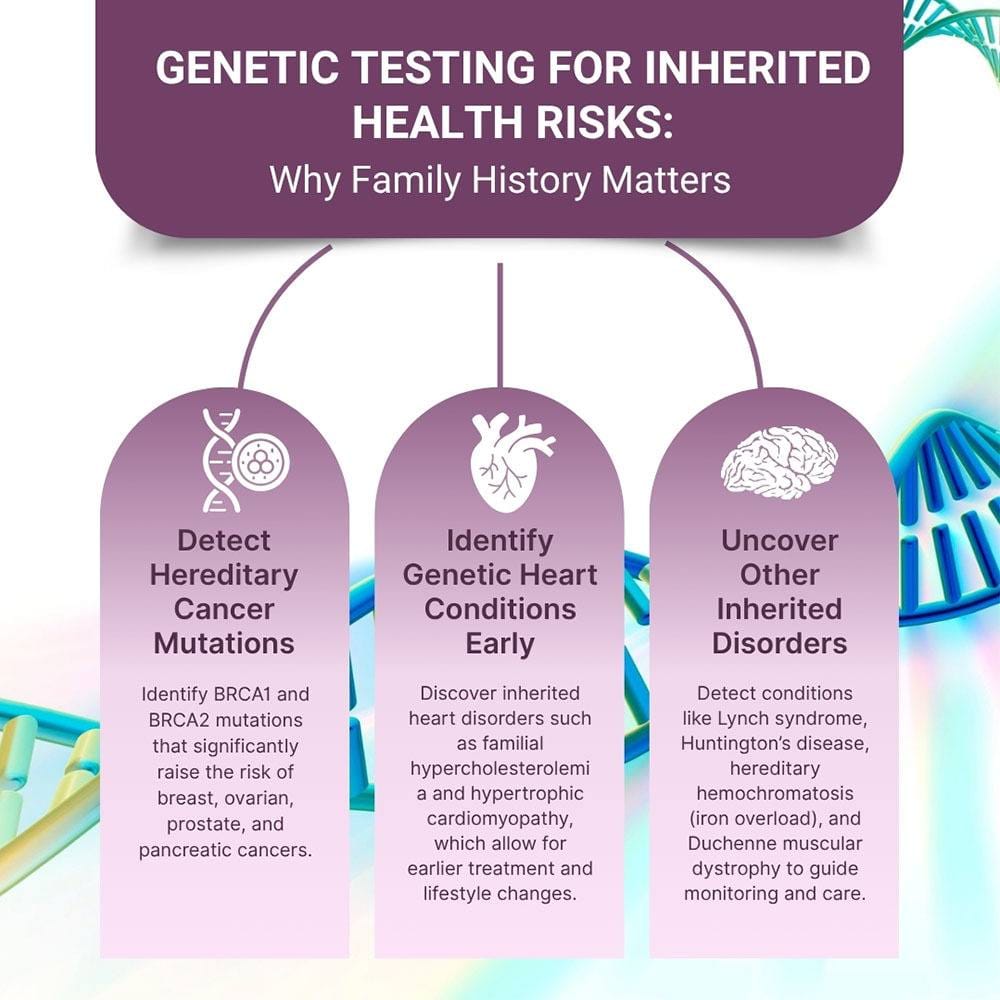What Is a Family History Risk Assessment?
A family medical history risk assessment evaluates your inherited risk for certain health conditions by reviewing the medical backgrounds of your close relatives. This information identifies whether you may face a higher risk for certain diseases and whether further steps like early cancer detection testing may be right for you. Many health conditions, such as heart disease, diabetes, cancer and some rare genetic disorders, tend to run in families. That doesn’t mean you’re destined to develop them, but your chances may be higher than average.
At Cohen Medical Practice (CMP New York), an experienced team under the guidance of Dr. Felix Cohen examines the patterns of disease in your family. Your family history risk assessment detects red flags that may indicate inherited risks. For example, if several relatives were diagnosed with breast cancer at a young age, it may point to hereditary cancer markers like BRCA1 or BRCA2 mutations. Hereditary cancer risk testing uncovers these patterns, which can lead to proactive care. A family medical history risk assessment typically involves gathering detailed information about your biological relatives including:
- What conditions were they diagnosed with
- At what age these diagnoses occurred
- Whether multiple family members had the same or related conditions
- Ethnic background, as some genetic risks are more common in specific populations
Should I Get Genetic Testing Based on My Family History?
If your family medical history risk results reveal a gene mutation linked to a higher risk of certain diseases, you may qualify for earlier mammograms, colonoscopies and genetic screening services. Your doctors then can catch diseases in their earliest stages when they’re more easily treatable. Knowing your genetic risk gives you control over prevention. You may choose to make lifestyle changes, start medications or even consider preventive surgeries. These steps dramatically reduce your risk of developing the condition or delaying its onset.
Genetic testing helps your doctors tailor your care to your risk profile. Rather than following general guidelines, your care plan becomes customized based on your DNA. This personalized approach improves the accuracy and effectiveness of your treatments and preventive care.
Sharing this information gives your family members the chance to get tested and receive benefits that include:
- Preventive strategies
- Customized health monitoring
- Family planning guidance
- Access to clinical trials
- Informed decision-making
- Potential insurance planning
- Support for mental and emotional well-being
- Guidance for future generations

What Conditions Are Commonly Associated with Inherited Risk?
Common examples of inherited conditions are BRCA-related breast and ovarian cancer. If you carry a BRCA1 or BRCA2 gene mutation, your risk for developing breast, ovarian, prostate or even pancreatic cancer is higher. These cancers often develop at a younger age. You may need earlier and frequent screenings or even preventive options to stay ahead of the risk.
If high cholesterol and heart disease are common in your family, you may be affected by familial hypercholesterolemia (FH). This condition causes extremely high levels of LDL cholesterol starting at a young age. If you have FH, your risk of heart attacks and stroke rises even in your 30s or 40s. Your family history may also reveals genetic heart disorders, such as hypertrophic cardiomyopathy. This condition causes the heart muscle to thicken, which leads to irregular heart rhythms or sudden cardiac arrest.
Other risks that family history assessments may reveal include:
- Huntington’s disease, a progressive brain disorder caused by a faulty gene
- Retinitis pigmentosa, an inherited eye condition that leads to gradual vision loss
- Hereditary hemochromatosis, a genetic disorder causing the body to absorb too much iron
- Lynch syndrome, a genetic condition that increases your risk for several cancers, especially colorectal, endometrial and stomach cancers
- Duchenne muscular dystrophy, a severe form of inherited muscle degeneration primarily affecting boys
Where Can I Get Assessed or Tested for Genetic Risk?
CMP New York offers expert care to determine your family medical history risk in Midtown Manhattan. Whether your family’s medical history puts you at risk or your provider has suggested genetic testing, this is the place to start. Since CMP New York is a gynecological practice, your family history may determine your need for specialized fertility services rooted in evidence-based medicine following a genetic screening, such as:
Whether you prefer to visit the Midtown Manhattan office or speak to your doctor from home for counseling, CMP New York offers flexible appointment options to fit your needs. If testing reveals a gene mutation or inherited risk, your care doesn’t stop there. Contact CMP New York today to make an appointment for genetic testing based on your family medical history risk levels and move forward with:
- Personalized screenings, such as pelvic ultrasounds, mammograms and colonoscopies
- Preventive options like medication or referrals for surgical consultation
- Prenatal testing
- Hormone replacement therapy
- Genetic counseling for you and your family to talk about shared genetic risks

